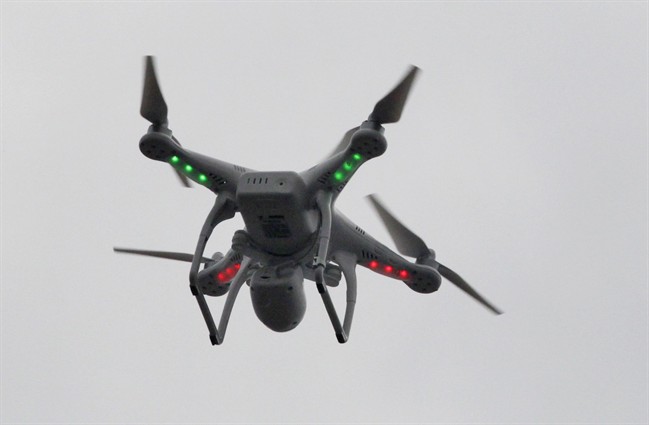A national agency that monitors civil liberties and human rights across Canada has put a call out to Hamilton police to suspend its drone program.

The Canadian Civil Liberties Association (CCLA) is characterizing the initiative as “invasive technology” that threatens the privacy of Hamiltonians since there’s no evidence any consultation with the public nor Ontario’s Privacy Commissioner ever happened.
“They have the capacity of invading people’s personal space and also diminished people’s sense of legitimacy in protest or in large-scale demonstrations,” CCLA Privacy, Technology and Surveillance director Daniel Konikoff told 900 CHML’s Good Morning Hamilton.
Since starting a program in 2021, Hamilton police have deployed their Remotely Piloted Aircraft Systems (RPAS) 59 times over the city.
An update during a police services board meeting in May revealed HPS staff revealed search and rescue, collision reconstruction operations and monitoring “large scale events” were the primary uses in the deployments.
The service also revealed plans to expand the program in the near future, which currently utilizes 11 part-time pilots within HPS.
“So it’s not like we are looking to immediately purchase anymore, we’re just looking to enhance the program that we’ve already got going on,” Community Safety Division officer and licensed drone operator Sgt. Fabrizio Giuliani told Global News.
Giuliani insists the HPS strategy is “very strict” and based on guidelines from the Office of the Information and Privacy Commissioner of Ontario (IPC) and Canada’s privacy commissioner as laid out in a Privacy Impact Assessment (PIA) recently conducted by the service.

Get breaking National news
“We spoke to Crown attorneys both in Hamilton and in Toronto with the impact that this potentially can cause,” he said.
“All of our pilots … are trained under the reasonable expectation of privacy. We are not out there frivolously taking pictures of anybody or flying around people’s backyards or anything like that.”
But Konikoff contests that PIA doesn’t prevent the arming of drones with weapons or facial recognition software, leaving the technology open to abuse and misuse.
Dr. Ann Cavoukian, former Ontario privacy commissioner and current privacy expert at Toronto Metropolitan University, says informing the public what the technology is actually capturing is paramount in assessing whether the tech is or isn’t overstepping boundaries.
“So you can’t just say, ‘Oh well, it’s a drone. It’ll do what it needs to do,'” Cavoukian said.
“No, we have to be vigilant. Exactly what information is captured by the drone relating to individuals? Is it personally identifiable data?”
Cavoukian is seeking a broader review of drones since several police services across Ontario are running similar drone programs which she questions have had proper privacy assessments conducted.
Konikoff believes that conversation needs to be with both provincial and federal entities and that Ontario’s current privacy commissioner should take a lead role in an examination.
“I believe they’re not investigating this right now,” he said.
“This sort of points to this broader legal issue about what is constraining police departments in Ontario into consulting with bodies of experts?”






Comments